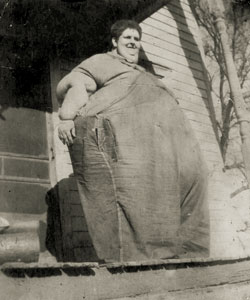My first job out of college–which started just a couple days after graduation–was with a pathology organization. I sat at a desk with a view of the Eisenhower, from which I derived entertainment watching traffic patterns, organizing papers about all the different ways to die.
Some of them were vivid: one of the first ones I read advised forensic pathologists on how to determine if a strangulation death was the result of autoerotic asphyxiation. The child pornography on the computer monitor–melted at the bottom, presumably when a pile of cigarettes in the ashtray next to it had at some point in the past caught fire–in the accompanying crime-scene photos was a prominent clue. The deceased’s Diogenes syndrome resulted in ankle-deep piles of trash covering the room.
Most of the papers were more literally incomprehensible: melanomas and blood diseases and the like, illustrated with innocuous-looking cells in pastel tones. The job was both morbid and mundane, but I needed the insurance.
One day at work I read a Sun-Times profile of Robert Kurson, who had recently published his first book, Shadow Divers. I knew of him through his Esquire piece "My Favorite Teacher," about Rick Lindwall, a beloved science teacher at Glenbrook North who was convicted of the rape and murder of a teenager and the kidnapping of two others: a John Wayne Gacy in the making. It’s a moving piece, and when it came out it earned a lot of deserved praise, including a nomination for a National Magazine Award.
I figured Kurson was a career journalist, but the piece was his first magazine story: he’d attended Harvard Law and was a practicing real estate attorney who hated his job; he told the Sun-Times, if my memory serves me, that he’d hear the tick-tick-tick at the beginning of 60 Minutes and get depressed because it signaled the start of another work week. So he quit, worked odd jobs, and got into the business the only way he could: as a data entry clerk at the newspaper that was, by 2004, writing about his success.
 And I was in the same spot Kurson had been, only instead of being a Harvard-trained lawyer, I was reformatting pictures of corpses and murderous cells. So I started tracking down Kurson’s pieces, to see how he’d done it. One in particular caught my eye: a profile of Robert Earl Hughes, a native of downstate Illinois and at one point the heaviest human being in recorded history at 1,041 pounds. As a childhood Guinness Book of World Records fanatic, I immediately recognized Hughes’s name.
And I was in the same spot Kurson had been, only instead of being a Harvard-trained lawyer, I was reformatting pictures of corpses and murderous cells. So I started tracking down Kurson’s pieces, to see how he’d done it. One in particular caught my eye: a profile of Robert Earl Hughes, a native of downstate Illinois and at one point the heaviest human being in recorded history at 1,041 pounds. As a childhood Guinness Book of World Records fanatic, I immediately recognized Hughes’s name.
But the story wasn’t online, I didn’t have a Chicago library card, and the back issue wasn’t available for purchase. So I wrote the magazine, and offered to pay for the issue if someone would mail me a photocopy or something. Someone at Chicago–I no longer have the e-mail, but I think it was my now-colleague Cassie Walker–was kind enough to fax it to me. And sure enough, it was an moving, humane piece that, like "My Favorite Teacher," draws on Kurson’s own life to illuminate his subject.
The story’s now online; I put it there. This week I was tasked with putting some of Richard Babcock’s favorite stories online, or at least the ones he loved but thought hadn’t gotten their due. "Heavy," Kurson’s profile of Hughes, was one of them, and it brought it all back to me.
I quit my job and took a part-time, jack-of-all-trades position at the now-defunct World Jewish Digest. I’m not Jewish, but my ignorance played a useful role for the knowledgeable staff, who ran stuff by me to make sure they were explaining things well enough for people who didn’t know as much as they did. I applied for jobs: I blew one for a job at a small downstate paper when I blanched about a story suggestion for "25 things to do with macaroni and cheese"–it might have been 50 things–and probably with the historically bad haircut I rushed to get a few minutes before the interview. I think I blew my Slate interview when I said the thing I’d change about it was "Christopher Hitchens."
While at the Digest, I ran across a promo copy of a book by Will Eisner, more or less the inventor of the graphic novel but unknown to me. I turned that into an essay that I sold to the Reader, which put me on their radar. On my second try, I got a job there. (The piece that made me want to work there? Dave Kehr’s "The Godfather of King Drive." Do read it if you haven’t.)
In his farewell to Chicago, Babcock had trouble picking favorite articles from the magazine he edited; if you work with writers, all their pieces mean different things to you, especially if you’re a good editor, which I’m not. For me it’s easy: "Heavy" will always be my favorite. It might not be the "best" article that’s ever been in Chicago, or even the best Kurson wrote. But I came across it when I badly needed a reason to keep writing, and it did, and that’s how I ended up here.


